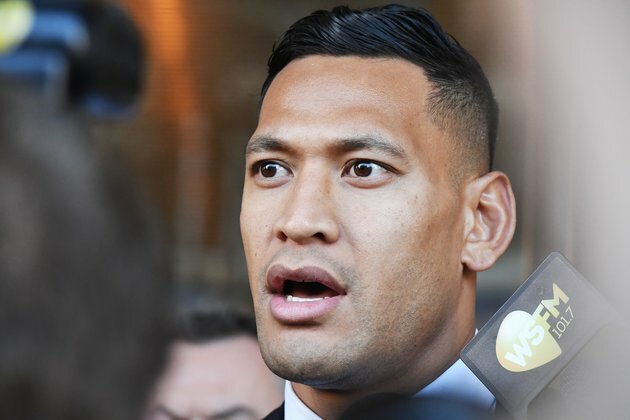How might an apology feature in the new religious freedom bill?
The Conversation
10 Sep 2019, 11:47 GMT+10

Sometimes legal disputes are about more than money. Sometimes what is really wanted is an apology - an acknowledgement of wrongful treatment. As former President of the Human Rights and Equal Opportunity Commission, Sir Ronald Wilson, said in White v Gollan, an apology can restore a complainant's "sense of dignity and self-worth".
If the federal government's proposed Religious Discrimination Bill becomes law, a person seeking an apology for religious discrimination will have a new avenue to do so.
As the law stands, the only federal protection against religious discrimination is in the Fair Work Act 2019. While a court can order remedies such as reinstatement or monetary compensation, there appears to be no case under the Fair Work Act which an employer has been ordered by a court to apologise for unlawful termination on the basis of discrimination - religious or otherwise.
Read more: Religious Discrimination Bill is a mess that risks privileging people of faith above all others
In contrast, an apology can be ordered under the proposed Religious Discrimination Act in conjunction with the existing remedy provisions of the Australian Human Rights Commission Act 1986.
The Religious Discrimination Bill has been modelled, in part, on the Racial Discrimination Act. Like the Racial Discrimination Act, complaints made under the proposed Religious Discrimination Act will be made initially to the Australian Human Rights Commission. They may then be referred to the Federal Court if the parties are unable to resolve their dispute.
One of the orders the Federal Court can make is for an apology. The Human Rights Commission Act allows a court to make an order requiring a respondent "to perform any reasonable act or course of conduct to redress any loss or damage suffered by an applicant". This can include an order to make a private and/or public apology.
There are several cases in which a court has ordered an apology for racial discrimination. In White v Gollan, for example, a publican was ordered to send a written apology and publish an apology in a newspaper circulating in the district after he refused to serve two people in the public bar because they were Aboriginal.
Courts consider that the aims of anti-discrimination legislation sometimes can be advanced by an order to apologise for unlawful discrimination.
In this respect, Israel Folau's case highlights a difference between orders made under the Fair Work Act and orders that will be available under the proposed Religious Discrimination Act.
Earlier this year, Folau called for an apology from Rugby Australia. He said:
Israel Folau's lawyer, George Haros, has said an apology would "come a long way to resolving the dispute".
However, Rugby Australia's Chief Executive, Raelene Castle, has so far ruled out an apology, saying:
The parties to the Folau case go to mediation on December 13. If that fails, the case will go to court in February next year. In his statement of claim, Folau has sought an apology. He will need to persuade the court that an apology order is necessary to "remedy" the effects of wrongful termination under the Act. However, obtaining an apology as an order rather than by negotiation is a long shot.
Read more: Why Christians disagree over the Israel Folau saga
Given Rugby Australia's reluctance to apologise so far, even if the court ordered an apology, would there be any point?
Some state tribunals have recognised that a distinction can be drawn between a personal, sincere and heartfelt apology, which cannot be compelled, and an apology that is an acknowledgement of wrongdoing under anti-discrimination legislation.
Despite the fact some judges regard an ordered apology as a contradiction in terms, identified benefits include a complainant receiving the remedy they seek, and public acknowledgement of unlawful conduct, which in turn promotes the aims of anti-discrimination laws.
Further, some cases show that once wrongdoing is found, those initially unwilling to apologise may be willing to do so. Finally, an ordered apology may restore a party's sense of self-worth and dignity.
Undeniably, monetary compensation can be an important to remedy for the harmful effects of discrimination. Yet the opportunity to receive an apology order may prove to be an important additional remedy under the proposed legislation.
Authors: Renae Barker - Lecturer in Law, University of Western Australia | Robyn Olive Carroll - Professor 
 Share
Share
 Tweet
Tweet
 Share
Share
 Flip
Flip
 Email
Email
Watch latest videos
Subscribe and Follow
Get a daily dose of Israel Herald news through our daily email, its complimentary and keeps you fully up to date with world and business news as well.
News RELEASES
Publish news of your business, community or sports group, personnel appointments, major event and more by submitting a news release to Israel Herald.
More InformationInternational
SectionTravelers can now keep shoes on at TSA checkpoints
WASHINGTON, D.C.: Travelers at U.S. airports will no longer need to remove their shoes during security screenings, Department of Homeland...
Rubio impersonator used AI to reach officials via Signal: cable
WASHINGTON, D.C.: An elaborate impersonation scheme involving artificial intelligence targeted senior U.S. and foreign officials in...
Warsaw responds to migration pressure with new border controls
SLUBICE, Poland: Poland reinstated border controls with Germany and Lithuania on July 7, following Germany's earlier reintroduction...
Deadly July 4 flash floods renew alarm over NWS staffing shortages
WASHINGTON, D.C.: After months of warnings from former federal officials and weather experts, the deadly flash floods that struck the...
Putin fires transport chief, later found dead in suspected suicide
MOSCOW, Russia: Just hours after his sudden dismissal by President Vladimir Putin, Russia's former transport minister, Roman Starovoit,...
Thousands gather in Himalayas as Dalai Lama celebrates 90th birthday
DHARAMSHALA, India: The Dalai Lama turned 90 on July 6, celebrated by thousands of followers in the Himalayan town of Dharamshala,...
Business
SectionGold ETF inflows hit 5-year high as tariffs drive safe-haven bets
LONDON, U.K.: Physically backed gold exchange-traded funds recorded their most significant semi-annual inflow since the first half...
PwC: Copper shortages may disrupt 32 percent of chip output by 2035
AMSTERDAM, Netherlands: Some 32 percent of global semiconductor production could face climate change-related copper supply disruptions...
U.S. stocks recover after Trump-tariffs-induced slump
NEW YORK, New York - U.S. stocks rebounded Tuesday with all the major indices gaining ground. Markets in the UK, Europe and Canada...
Stocks slide as Trump unveils 25% tariffs on Japan, S. Korea
NEW YORK CITY, New York: Financial markets kicked off the week on a cautious note as President Donald Trump rolled out a fresh round...
BRICS issues rebuke on trade and Iran, avoids direct US criticism
RIO DE JANEIRO, Brazil: At a two-day summit over the weekend, the BRICS bloc of emerging economies issued a joint declaration condemning...
BP appoints ex-Shell finance chief Simon Henry to board
LONDON, U.K.: This week, BP appointed Simon Henry, former Shell finance chief, to its board as a non-executive director effective September...













